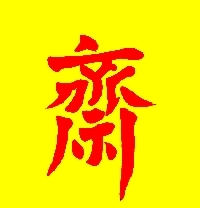Just follow the signs

Wherever there are places serving vegetarian cuisine, you will find some with an English sign that says "vegetarian" (or a recognizably similar spelling).
However, simply becoming familiar with the two Chinese characters alternatively used to indicate vegetarian can expand your choices considerably, so why limit yourself?
The two most frequently used characters for "vegetarian" are shown at left.
That's all there is to it.
Memorize them, draw them, carry a printout of this page, download them into your hand-held computer - choose your crutch.
The remainder of this discussion provides details of usage and connotation included more for the curious than the hungry.

Ignoring issues of dialect and tone, let's simply refer to the upper character as zhai and the lower as su.
zhai translates 1 as:
- 1. pious; respectful; chaste; pure
- 2. abstain from meat; fast
- 3. purify oneself
- 4. provide Buddhist monks with meals
- 5. room for study; study; school
- 6. vegetarian diet; vegetarian meal
This character implies food (or diet) that is in accord with Buddhist precepts prohibiting:
- meat, egg, dairy, animal products
- pungent plants (onion, garlic, leek, etc.)
- alcohol (not drinking, nor even flavoring with a dash of Chinese rice wine, as is common in Chinese cooking)
- tobacco (smoking)

su has 8 distinct translations:
- 1. pure white silk
- 2. white (color)
- 3. plain; simple
- 4. mourning
- 5. vegetarian; vegetable food; vegetarian diet
- 6. heretofore (formerly); up to the present
- 7. usually; generally; normally
- 8. the original constitution of things; matter; elements
A thread common to all these translations: the pure, simple, original, normal. White is without coloration, hence plain and austere, yet also viewed as pure. (Note that in traditional Chinese culture, white is considered the color of mourning).
The consensus I've gotten from Chinese speakers is that:
- su implies food (or diet) that is pure, natural, from the earth.
- su does not have the religious connotations of zhai.
- su meals are commonly taken by women who may or may not be following vegetarianism, but desire a slim, healthy appearance.
- su diet excludes meat, but not necessarily eggs. Dairy is not really an issue in Chinese cuisine.
That's the theory. However, in practice, the distinction is not so clear-cut, as su is now commonly used for both styles. In fact, some restaurants display both characters.
Note that some sources (e.g., older editions of Lonely Planet's Taiwan guide) suggest looking for the swastika to find vegetarian eateries. However, I found it to be rarely used by eateries and often used by establishments that have nothing to do with food. Therefore, if you want vegetarian food, look for the "vegetarian" characters. They're easily recognized and unambiguously used if and only if vegetarian food is being served.
- Translations taken from Chinese Characters and Culture and Chinese Character Dictionary . ↩
